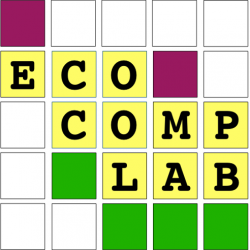A full-time PhD position in theoretical ecology is available in the lab of Dr. Shai Pilosof (Ben Gurion University) as part of an Human Frontier Science Program in collaboration with Dr. James Hall (University of Liverpool) and Prof. Manlio De Dominico (University of Padua).
You will develop novel theoretical and computational models to explore the eco-evolutionary dynamics of microbial ecological networks and how they respond to changing environments. Theoretical results will be integrated with experiments on bacteria. You should have an MSc that has combined biology with computational or mathematical methods.
The position is available for 4 years.
Project description
In a world fraught with human impact, understanding how organisms, and communities of organisms, respond to environmental changes, is one of the most fundamental challenges in biology today. This collaborative project integrates theoretical and modelling approaches with experimental microbiology to explore the response of ecological communities to environmental change, using bacteria as a model. Not only are microbes a tractable system for exploring general principles of community ecology, they also play a fundamental role in global biogeochemistry, human and animal health and disease, food security, and ecosystem function. Understanding how microbial communities respond to perturbations, both at the species level, and at the community level, is therefore a pressing issue.
Network theory offers a powerful tool for understanding community ecology. Communities can be described as networks, with nodes indicating different individuals (or species), and edges indicating the interactions. However, these networks are not static, with interactions varying with environmental change, and over evolutionary timescales. Furthermore, individuals often interact simultaneously in qualitatively different ways. For example, in microbial communities, species compete for resources, while exchanging genes on plasmids or other mobile genetic elements.
In this project we will model the eco-evolutionary dynamics of highly-diverse microbial communities, and the emerging structures using state-of-the-art multilayer networks. We will also develop theory to understand how these networks respond to environmental perturbation. These models will be integrated with experital results from model bacterial systems.
This project is a highly interdisciplinary, international collaboration between groups based in Israel (Dr. Shai Pilosof), UK (Dr. James Hall), and Italy (Prof. Manlio De Domenico), bridging ecology and evolution, microbiology, and statistical physics.
Location and travel
The candidate will be located in Beer-Sheva, Israel and will work principally with Dr. Shai Pilosof. In addition, the candidate will visit the labs of the other team members in Italy and UK to enhance collaborations and knowledge sharing. All travel is funded.
Duties and responsibilities
- Developing theoretical and/or computational models of eco-evolutionary dynamics. Analysing stability and structure of multilayer networks.
- Cooperating with team members, preparation of manuscripts, and disseminating findings, primarily in the form of academic publications and conference presentations.
- Regularly meeting with members of the wider project team, including in-person and virtual meetings, to communicate results and assist in integrating modelling with experiments.
Experience, skills and qualifications
- An MSc that has combined biology with computational or mathematical methods.
- Experience with modeling or mathematically studying biological systems.
- Programming skills in at least one of: Julia, Python, R.
- Desirable: Agent-based modeling is an advantage. For candidates with no experience — the ability to quickly learn ABMs.
- Excellent interpersonal and communication skills, written and verbal.
- Excellent skills in scientific writing and presentation, e.g. oral presentation at national/international meeting.
Personal skills
- Dependable, reliable, and self-motivated.
- Able to work in a team environment and contribute to the development and growth of the research team, including students and visiting collaborators.
- Willingness to visit collaborators’ labs in Italy and the UK.
- Enthusiasm for microbiology and community ecology.
- Excellent communication and interpersonal skills.


